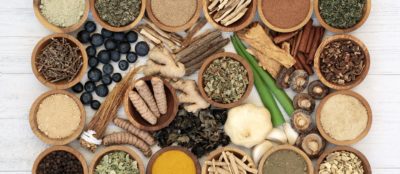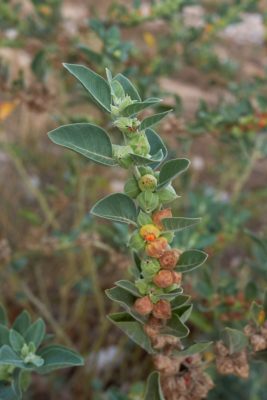
Adaptogens are therapeutic botanicals that can help strengthen your body’s natural response to stress. Adaptogenic herbs have a long history of use in indigenous cultures and traditional healing systems. In this guide, we’ll check out popular adaptogens for stress relief and how their benefits mesh perfectly with modern life.
What are Adaptogens?
You can think of adaptogens as nature’s antidote to everyday stress. From root to leaf to mushroom, adaptogens are time-tested treasures of the natural world that help our bodies adapt—optimizing our systems to deal with the effects of stress. This in turn can help you stay well in both body and mind.
Scientists began researching adaptogens around World War II, with the goal of enhancing soldiers’ stamina and performance. Adaptogens have also been deemed useful for space exploration, Arctic expeditions, Olympic games, and even chess competitions! While the term “adaptogen” was coined only about 70 years ago, these herbs have been helping humans for millennia. Rhodiola root, for example, has long been used in traditional Russian and Scandinavian medicine. Tulsi and Ashwagandha are revered herbs in Ayurveda, a healing system of India. Reishi mushroom has been prescribed for thousands of years in Traditional Chinese Medicine.
Adaptogenic herbs themselves thrive in harsh conditions. For example, Maca grows at high elevations in the Andes Mountains where no other crops will survive. Rhodiola grows in the Siberian mountains—10,000 feet above sea level in extreme cold and low oxygen levels. Ashwagandha is native to desert regions. Their ability to withstand intense conditions shows how hardy these herbs are. It seems fitting that they can help humans in our own times of intensity!
How Stress Affects the Body
The human body is naturally wired for a “fight or flight” response. This natural stress response is an ancient survival mechanism. When it comes to stressful challenges, whether it’s a leaping leopard or just annoying traffic, our bodies prime for fight or flight. During moments of stress, the hypothalamus signals to increase cortisol production (as well as adrenaline and noradrenaline production). Cortisol is a stress hormone made in the adrenal glands. It plays several important roles, including fighting inflammation, regulating blood pressure and blood sugar, and regulating metabolism and energy production.
Sometimes our self-preserving fight or flight instinct is helpful. But in a busy world of small hassles, the body may be continually reacting as if under threat. The spikes of stress hormones can start to be exhausting and impact your health and mood. In fact, ongoing stress can end up affecting all systems of the body. Stress can even impact our gut bacteria and the absorption of nutrients! It has been estimated that 60–80% of visits to the doctor may be stress-related in some way.
How Adaptogens Work
To be considered a true adaptogen, an herb must meet three criteria. It must be considered non-toxic at normal doses. It should support the whole body’s ability to respond to stress. And it should have a re-balancing effect, helping the body return to equilibrium. Let’s dig into that a bit more.
As the name implies, adaptogens help our bodies adapt and bounce back from various states, like being stressed or being tired. Research shows that adaptogens work through your HPA axis (hypothalamic-pituitary-adrenal axis) to stabilize and regulate production of stress hormones, such as those fight-or-flight spikes of cortisol. This helps your body find a place of balance. If you are fatigued, an adaptogen can help support your energy levels. If you are feeling stressed, it can help you wind down. Adding high-quality adaptogens to your daily regimen, then, can help your body adjust to the effects of stress
General Benefits of Adaptogenic Herbs
Adaptogens are powerful allies for natural wellness. These amazing herbs and mushrooms work holistically with your nervous, immune, and endocrine systems to help your body deal with modern-day stressors, whether it’s the state of the world, a demanding job, an irritating commute, recovery after exercise, or whatever else is stressing you out! Adaptogens’ benefits have both mental and physical aspects.
Examples of Mental Benefits Include:
• Helps fight fatigue and mental exhaustion
• Improves attention, memory, and focus
• Supports restful sleep
• Supports cognitive function
• Addresses occasional depression or anxiety
• Soothes nerves and increases relaxation
Examples of Physical Benefits Include:
• Supports healthy inflammation response
• Has antioxidant effects
• Supports healthy aging and vitality
• Improves endurance and physical performance
• Provides sustained energy
• Supports sexual health
• Supports immune function
• Regulates blood sugar
Adaptogenic Herbs List
The following adaptogens list includes some of our favorite herbs and mushrooms. These nutritional powerhouses are amazingly adaptogenic, meaning they can help you resist the effects of occasional stress and help restore well-being in your body.
Ashwagandha (Withania somnifera) is one of the most revered plants in Ayurvedic medicine. Its name means “smell of the horse”—both for its actual smell and the belief that consuming the herb might give a person the strength and vitality of a horse! It is also referred to as the “Royal Herb” for its rejuvenating effects on the body. Ayurvedic practitioners claim it promotes youth and longevity. Ashwagandha contains compounds that can help relieve symptoms of stress. Ashwagandha is both calming and revitalizing.
Maca (Lepidium meyenii) is native to the Andes in Peru and was often used as a staple in South American cooking. It has an earthy taste and is a cruciferous vegetable. Maca has been used to support fertility. As an adaptogen, it has been used to help boost and balance energy.
Rhodiola (Rhodiola rosea) is also known as “golden root” or “roseroot.” It has been used in the traditional medicine of Russia and Scandinavia to treat fatigue, depression, and nervous system disorders. It has also been used in modern herbal practice to enhance endurance and stamina.
Holy Basil (Ocimum sanctum), or Tulsi, is a member of the mint family. In Ayurvedic medicine, it is often referred to as “The Queen of Herbs” or “The Incomparable One.” It has been revered for hundreds of years. Some consider it the most sacred plant in the world. In modern research, Tulsi has been shown to increase immunity and to ease depression and anxiety.
Eleuthero (Eleutherococcus senticosus) was sometimes called “Siberian Ginseng,” though it is no relation to the true Panax Ginseng family. Eleuthero root is beloved for its stress-protective effects in the body and has been studied for its ability to boost energy and stamina. In the Chinese herbal tradition, Eleuthero has been used to support qi (life force).
Adaptogenic Mushrooms
Herbs are not the only substances that can be adaptogenic. The Reishi mushroom (Ganoderma lucidum, Ling Zhi variety) has been used for centuries in Traditional Chinese Medicine as a general tonic. It is regarded as an “herb of spiritual potency” that supports well-being and longevity. In China, Reishi has a history of use for energy, heart health, memory, and overall vitality.
Ways to Consume Adaptogens
Depending on your preference for ease and flavor (some herbs taste better than others!), there are a ton of ways to consume adaptogenic herbs.
Adaptogenic Foods
Maca and Ashwagandha, for example, are often sold as powders, which can easily be blended into a smoothie. Holy Basil makes a delicious tea. You can also use it in place of traditional basil to make pesto or add it as a tasty garnish to noodles or soups. Schizandra berries, another adaptogen from Chinese and Russian traditions, are delicious and can be brewed and frozen into ice cubes to flavor water. Astragalus root can be cooked into a soup for an immunity boost. And for something even more effortless, most of these herbs and mushrooms are available in liquid tincture form. Just squeeze drops into water or your favorite beverage (be sure to follow dosage on label) and drink.
Adaptogenic Supplements
If you’re not eating Holy Basil leaves on a daily basis or whipping up Ashwagandha smoothies, there is a super-convenient way to weave adaptogens into your routine. Take them as supplements!
New Chapter® has a growing family of powerful adaptogen supplements to help you build your regimen.
• Magnesium + Ashwagandha Tablets includes Magnesium supplement for muscle, bone, heart & nerve health, plus supports calm & relaxation with science-backed Ashwagandha.*
• To jumpstart your day with a combination of adaptogens that includes Rhodiola, Maca, and a clinically studied dose of Eleuthero, turn to Energy Boost One Daily Multiherbal. This first-of-its-kind formula can help fight fatigue without caffeine and can be taken right alongside your multivitamin.*
• For adaptogens that are fine-tuned to soothe, Sleep Well One Daily Multiherbal is your non-drowsy, non-habit forming sleep support with clinically studied Tart Cherry and soothing Ashwagandha.*
This is a sponsored blog post.







